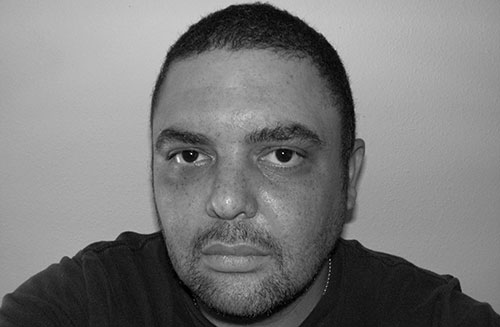
Each month we feature a guest post from a contributor to Poetry’s current issue. Shane McCrae’s poem, “Still When I Picture It the Face of God Is a White Man’s Face,” appears in the November 2015 issue. Previous posts in this series can be found on the Editors’ Blog.
I look now at “Still When I Picture It the Face of God Is a White Man’s Face” and I almost don’t know where it came from. But I know where it came from.
Two years ago, when I was 38, I started to get anxious about turning 40. And since I’m a poet, the thought that followed hot, and panting, a little out of breath—I’m a poet—on the heels of my anxiety was, “I guess I ought to write my great poems about turning 40 now.” OK—probably, I didn’t think they would be, you know, “great,” but I knew that aging was one of the “great” poetry subjects, especially, unfortunately, for male poets. And it seemed like a good idea to get the poems out of the way before I actually turned 40 and found myself too enfeebled to write them.
Which was pretty smart, actually—I can’t imagine wanting to write them now.
Anyway, for a few days, maybe a whole week, I tried to approach these poems, my future “later poems,” from several different angles, and I even actually finished, or thought I had, a few of them. None of them seemed good, or even promising, but every one had a beginning, and one, in particular, had an ending I thought was OK. That poem was called “I Ask Her Does She See It.” It started out like this:
What are those gnats
and bones the kind of thing
I see there and would say there’s nothing there
and eventually most of it became a poem called “Like Everybody I Had Assumed I Wouldn’t Live to Be This Old.” Really. But the ending I hacked off.
I hacked the ending off because I liked it, and at first I thought I would write a new beginning, because as it stood the poem started out like this:
Before it disappears
on the sand his long white beard before it disappears
The face of the man
in the waves I ask her does she see it ask her does
and that seemed a little weird to me—it seemed like in medias res taken one step too far. But then I sat with the poem for a while, not doing anything to it other than, you know, rubbing my chin musingly whilst gazing upon it, as one does—and I think the poem earned this reprieve because, as I’ve said, I liked the ending, and found I liked the ending even when the beginning seemed a little weird.
I don’t know how much gazing musingly it took for me to realize that the poem’s weird beginning made its ending stronger; but it wasn’t, I don’t think, too long before I at least realized the poem was, or seemed to me to be, a functional poem. What I like about the beginning now is the way the poem seems to stumble into an iambic hexameter line, and then stumbles again, and more quickly the second time, into another iambic hexameter line. The effect is achieved—not, please don’t get me wrong, to suggest that I think it’s an “achievement,” but it is a little thing I like—by starting out with a kind of mid-thought, fairly straightforward iambic trimeter line—a few quick steps—followed by the first foot of the first hexameter line, which is, for counting purposes, an iamb in which the first two syllables—“in the”—are elided into one, making the foot sound like an anapest, which is a stumbling, headlong, rushing foot. And the effect is achieved again, in almost the exact same way, in the next two lines, except that the first of the two is an iambic dimeter line with its own pair of elided syllables—“of the”—in the second foot. I like to think all of this stumbling and rushing toward hexameter sets up the elegiac (or pseudo-elegiac, since it’s iambic) couplet that ends the poem:
She thinks it might he might be real she shouts Hello
And after there’s no answer answers No
The (pseudo-) elegiac couplet—a hexameter line followed by a pentameter line—is a form I’ve always wanted to use. But until I wrote “Still When I Picture It the Face of God Is a White Man’s Face,” I had never been able to make one work in a poem. And when I realized it was a poem, one I was going to keep, I started to wonder what it might be about. And I saw that, for me, at least, it wasn’t about my fresh proximity to the reaper, but instead about the new world I hope I see coming, the world my children will inherit.
Poet Shane McCrae grew up in Texas and California. The first in his family to graduate from college,...
Read Full Biography

